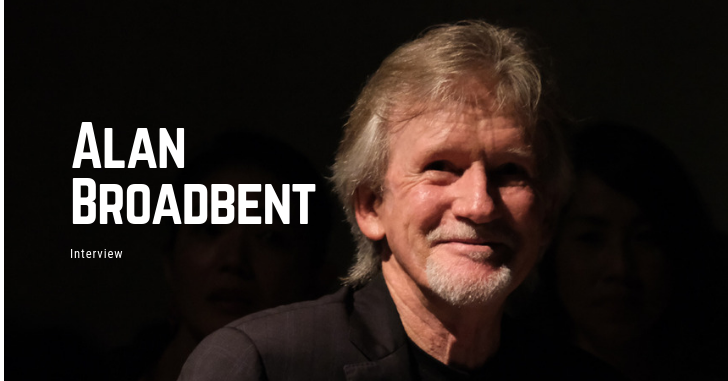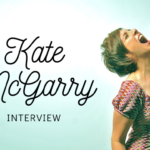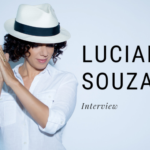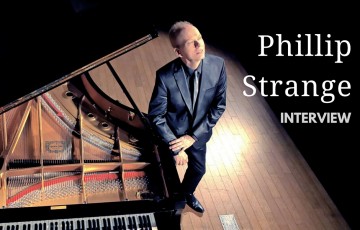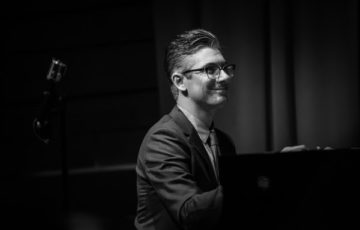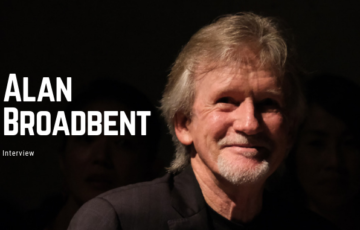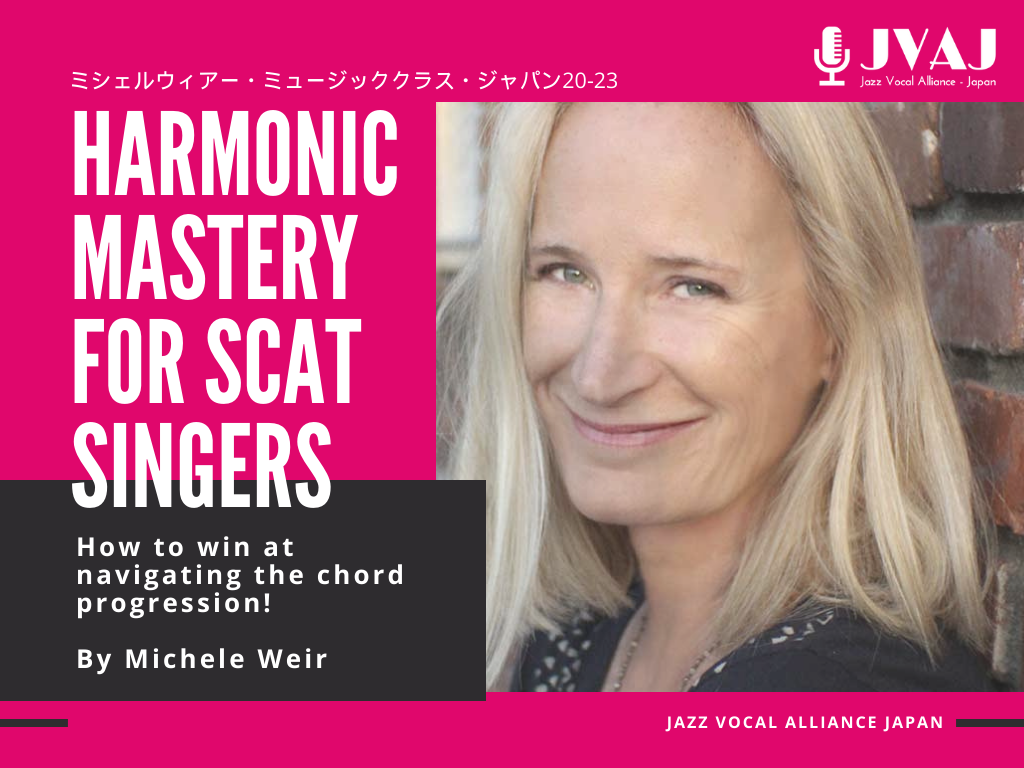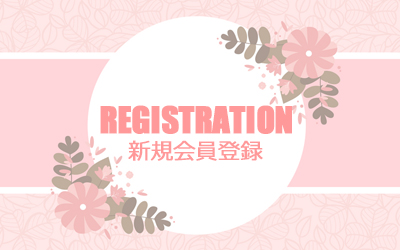Today we’d like to introduce you Alan Broadbent — a world-class jazz pianist, arranger, composer, and conductor known for his work with artists such as Charlie Haden, Woody Herman, Chet Baker, Irene Kral, Sheila Jordan, Natalie Cole, Diana Krall, and many others.
This interview brings together questions from jazz singers and vocalists in Japan to ask Mr. Broadbent about his music, teaching approach, and philosophy of the art of jazz. He also shares some messages for singers, accompanists and jazz aficionados.
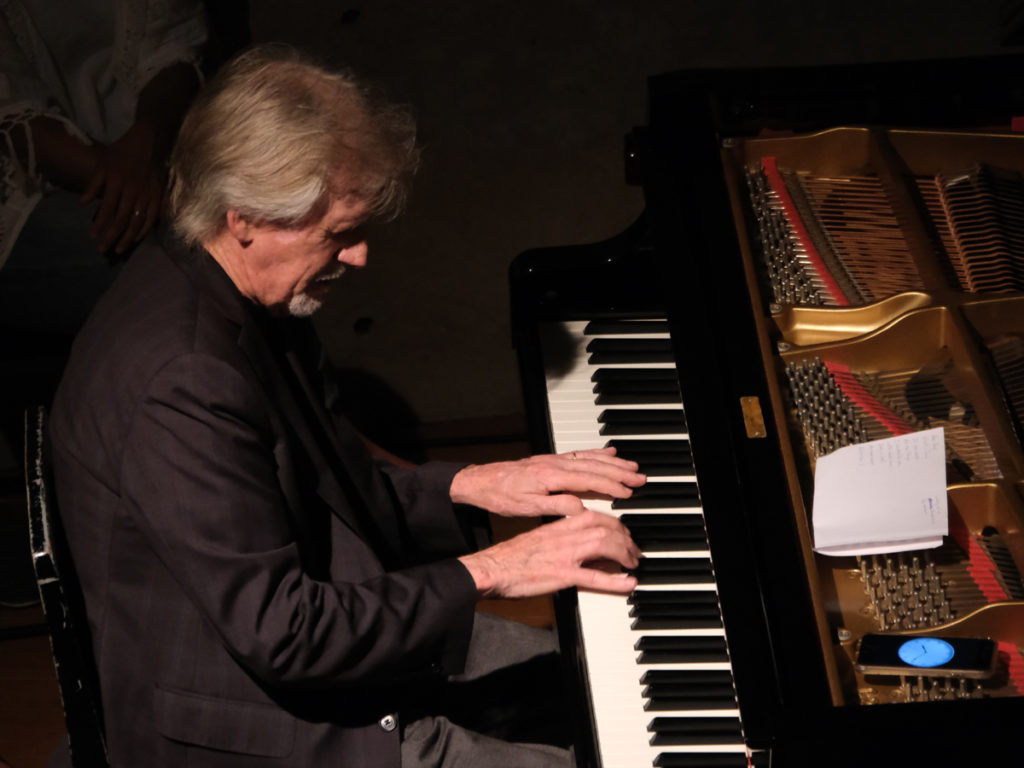
Photo by Dai Murata
September 4th at Half Moon Hall Shimokitazawa
Interviewer: May Okita (Jazz singer, Representative director of Jazz Vocal Alliance Japan),
Aly Inoue (Jazz singer, Chief member of JVAJ)
- English (United States)
- 日本語
Interview with Alan Broadbent
May (M): Hello, Mr. Broadbent!
Alan Broadbent (AB): Hi, May, you can call me Alan.
M: Thank you, Alan. Oh my gosh! I never expected to talk with you in person like this…thank you for this wonderful opportunity! We’re so excited to have you in Japan. How are you feeling about coming to Japan for the first time in many years?
AB: Well, I always love Japan. The hospitality, the kindness of the people, and their interest in music, and my music. It’s very, very inspiring to come here and play for people who are great listeners. I’ve been here in many situations — Quartet West, once with Irene Kral many years ago…
M: You know, I have your CDs here. I actually brought these.
[Talking about Irene’s Angel Eyes: Live in Tokyo and Where is Love?]AB: You do! Oh, my goodness!
Aly Inoue(Al): I love this one, too!
AB: That’s the one with our Japanese friends.
M: The bassist you played with on this CD — Kunimitsu Inaba — is my favorite bassist, and he came to play at my wedding party. So I personally feel very…
AB: Connected.
M: Yes! Well, you are a musical hero for us jazz musicians in Japan, recognized not only as a great jazz pianist, but as an accompanist, arranger, and conductor, and you have worked with legendary musicians like Charlie Haden, Chet Baker, Irene Kral, Shirley Horn, Sheila Jordan, Natalie Cole, Diana Krall, and lots of other world-class musicians.
AB: Yes.
M: You’ve contributed to so many great albums. I’ve been fascinated by your playstyle since I started singing jazz. Albums like Diana Krall’s Live in Paris and Jane Monheit’s In The Sun and Taking a Chance on Love came out just about when I started singing jazz.
AB: I see.
M: So I’ve been learning and growing as a jazz musician through your previous work. I’ve learned so many things from your great music.
AB: Oh, I’m so pleased. It’s good because sometimes, you know, musicians — we stay at home, we practice, and we wonder. It’s hard work, and we wonder if people appreciate it. And then to find somebody like you, who does know about the music and appreciate it, makes it worthwhile for us. We don’t realize it sometimes, because we’re hard-working. But when we get that recognition from people…
M: You know, when I looked at your website, there are so many albums you worked on. And so many of those are favorites of mine.
AB: Oh, were there? That’s good! You know, it looks like a lot. But my career has been spanned almost 50 years. So it’s only really one album per year. It looks like a lot, but really it’s only one every year, almost. But I’m glad that what I have done has some meaning in our lives and jazz, and I always feel that the music we play is important for communicating love. We live in this commercial world, where it’s all about selling you something, or money, or “selling millions.” But for us, it’s closer to the heart, I think.
M: I think that certainly comes across in your music.
AB: Oh, thank you. That’s why I do it!
M: And that’s why we love you.
AB: (laughing) Well…
M: I love instrumental music, like your trio, and I love your new album. Also, Quartet West is just amazing. It’s almost like a “Bible” for us jazz musicians today.
AB: Do you have Sophisticated Ladies? That’s an amazing record.
M: Yes, that’s my favorite! As a member of the Jazz Vocal Alliance Japan, I would love to know more about you and Irene Kral. Where is Love? is a favorite album, for sure. Did you just go into the studio and make music together, or was there more planning involved?
AB: That’s exactly — you described it perfectly. We had no plans. We had been working together for about a year.
M: Just one year?
AB: Yeah, we met each other because her piano player couldn’t make a gig, and she called me. She had heard about me. So we rehearsed, and for the next year, we started doing gigs around Los Angeles, and we decided to record some of these things. So we went into the studio and I said: “What would you like to do, Irene?” “Oh, I don’t know, what do you want to do? You know, it was that sort of thing.
M: Oh, my gosh!
AB: So, there was no plan. It just had that feeling of spontaneity. That’s how we like jazz to be.
M: The album’s amazing! Jazz singers always listen to those two albums [Where is Love? and Gentle Rain]. I think you have one more – Kral Space?
AB: Yeah, that is the best one for me. But it’s very hard to find.
M: I’ll keep looking for it. My jazz teacher taught me to listen to those albums intensively and feel what you two did, and try to imitate that, and learn something from there. So I’ve been listening to this album for quite some time.
AB: But I think that’s how we all learn jazz, is by listening to the masters. And by copying them, you aren’t copying their style — you’re copying their musicianship. And it teaches you how to phrase, intonation…I think it’s an important way of learning. And people like Irene leave this legacy for other singers.
M: You didn’t have any plan from the outset, but there are some medleys.
AB: Oh, we had those plans, already. We had those from working in clubs, so we knew what we would do.
M: So how did you pick those songs?
AB: She had her set list, and said: “What would you like to do?” “Shall we do this one?” “No, let’s not do this one” “Ok, let’s do this one.” And that’s how we made the record.
M: Oh, I see. I think she (AI) loves this one, too.
Al: Yes, I love this one. I also titled my first album Where is Love?
AB: Oh, really! Yes, the song doesn’t belong to her. It belongs to everybody.
Al: I first heard it on Oliver!
AB: Yes, it has such a beautiful score.
Al: After I studied jazz, I heard Barry Harris play that tune. And I thought to myself, “I know this tune!” So I found the sheet music and began singing.
AB: That’s great. Like I said, we work hard, and concentrate on what we do, but we don’t realize it’s spreading out and affecting people…
M&Al: It affects many people!
AB: Yes, so we hope. Not like Cardi B, or anything. She’s a rap singer who sells millions.
M: (laughs) Jazz musicians could never be like that…
AB: (laughs) Yes. There’s an old joke: the reason why we became jazz musicians is because we don’t like crowds!
M: Me, too! I’m the same! (laughs) And we love connecting with people and having conversations.
Whenever I listen to your music, I feel that when you comp the cords, you bring the best out of the vocalist or soloist. And when you play a solo, there is always a beautiful story which comes from the heart.
AB: Thank you, May.
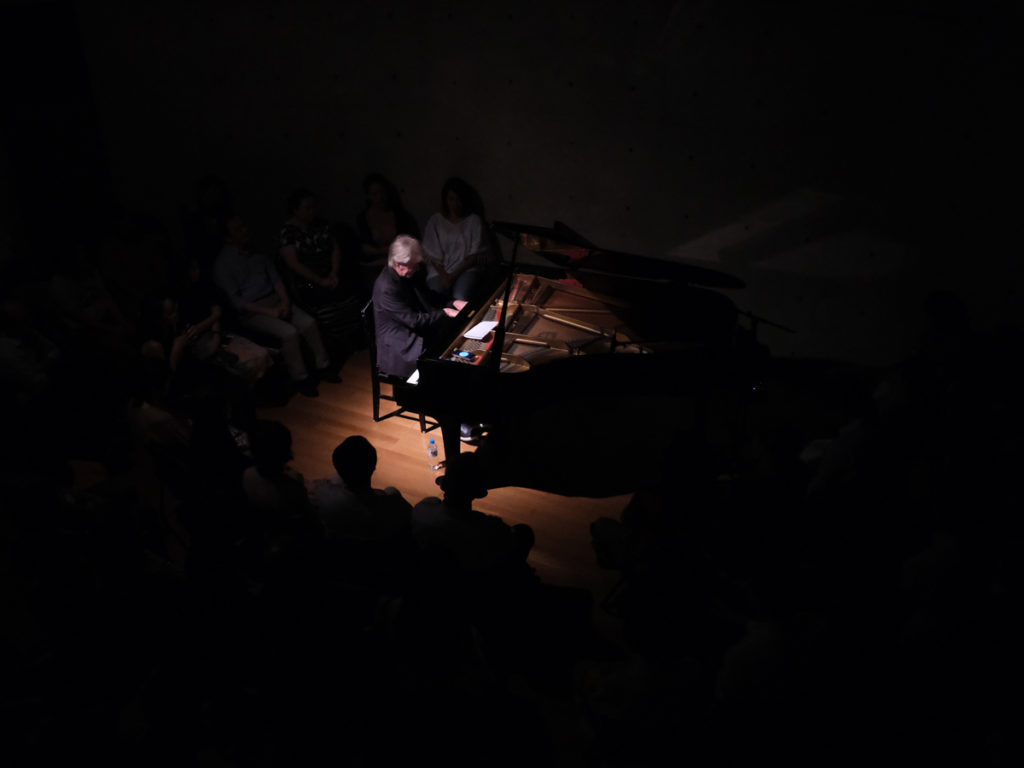
Photo by Dai Murata
M: How did you develop this beautiful philosophy of jazz?
AB: Well, that’s hard to explain. I also love the orchestra, and I write for the orchestra. So it translates into my piano play. And I think about the orchestra, like when the singer is singing this, maybe I’m playing the piano like strings, or something. It’s still a piano, but I’m hearing orchestrally.
And then when I come to improvising, that’s just intuition, and my knowing the harmony, my knowing the rhythm, and creating a beautiful phrase, like Chet Baker, or somebody. But at that point, I’m not a piano player. I’m thinking more like a horn player or a singer. So that my line has a singing quality that is connected to the voice.
M: You gave an interview with All About Jazz that was about eight pages. There was an anecdote about you flying to NYC to see your teacher, Lennie Tristano. He told you to sing Lester Young’s phrases until he allowed you to play the piano. That was very interesting – I learned quite a lot from that.
AB: I learned from that, too! Because a lot of jazz piano that I hear now is not connected to the voice. It’s connected to the piano technique, which is fantastic — I’m impressed, and I can’t do it myself – but it leaves me cold. I’m listening for the piano player who’s singing me a song, just like a horn player would, and not giving me piano music. If I want to listen to piano music, I’ll listen to Chopin.
M: Right.
AB: There’s the combination of great technique and singing. Chopin always insisted to his students: “Sing!” “You must sing!” That was Chopin. You know?
M: Oh, I didn’t know that.
AB: The great piano players have that singing quality, not just technical quality.
M: So you learned that from your teachers and old recordings?
AB: Yes, and especially because I play with singers, so I needed to understand it from that point of view.
M: How do you come up with those beautiful arrangements for each singer?
AB: Well, sometimes I improvise. With jazz singers, as you know, it’s flexible. We don’t want the exact same thing every time, otherwise it’s classical music or pop music – you can’t change it. But in jazz, we want to change it every time, because that makes it more interesting, challenging, and fun! We can bend the rules and take risks, and that’s what jazz is about, is risk-taking – and love.
M: What do you think is most important when you play and bring something to the listener’s heart? Would that be love, like you said?
AB: Well, I’m not thinking about love per se, it’s just…I’m trying to play the right chords, I’m trying to feel relaxed, and trying to communicate something. If you are a true jazz musician – vocalist, horn, piano player – you really don’t know what’s going to happen. So you live your life like that, which is a bit dangerous, like: “Tonight, I know the songs I’m going to play, and I might have played them a thousand times, but I will never play them like I play them tonight.” Because it will be different. Sometimes if I think about it, I’m scared. “Oh, my goodness! Why can’t I just have something that’s the same all the time, so I don’t have to worry?” (laughs)
But that’s not the way it is. And that’s the life we choose. So I have the freedom to change a chord: “I never did this chord before, here.” But it still is within the context of the song I’m playing. If you do that with pop music, well, you can’t change it. If I change a chord in a pop song, a rap song, or other commercial songs, it changes the meaning.
M: You talked about rhythm in your past interviews. I wanted to ask you how you picked up that jazz rhythm.
AB: Well, I understood it when I was very young. I had the feeling for it. And the feeling for jazz is very deep and very special, when it comes to the rhythm. And it all changed with modern piano players like Bud Powell through Nat King Cole. The ability to “sing” on the piano – before, with Teddy Wilson, Art Tatum, all those great, wonderful players, it was more ornamental. Wonderful playing, but there is no tension between the left hand and the right hand like there is tension between the soloists and the rhythm section. So the time isn’t going straight down the middle. The soloist is bending the time.
M: Right.
AB: And you can feel it. And what Bud Powell taught us is that the rhythm is in the improvised line that I’m making. Not in the lick. Not in the boom chik boom chik boom chik. The rhythm. Do ba da ba da ba du ba pa da da. You can feel the rhythm when I do that. And I don’t have to spell, one, two three. You know it: pa pa da da ba do du da. But if I go straight, that’s not swinging. We have to learn how to go: pa pa pa du ba da ba du da. It’s hard for piano players to quantize it naturally. Horn players do it naturally, but piano players have to learn the right fingerings to do that. I don’t want to get too technical, but…the rhythm, for me, is to be found in the song and in the line that I am playing.
M: You mean melody?
AB: Yes, or the improvised melody.
M: Right.
AB: So it’s not all da-da-da-da [even]. It’s da-DA-da-DA [with articulation]. That’s something piano players have to learn – to phrase like that.
M: Vocalists, too.
AB: Well, singers do it naturally, I think. When I had students, when they tried to play on the piano, it was very stiff. But when I said to them, “well let’s put the metronome aside, and let’s sing it,” it changes everything. The rhythm is there. We sing naturally like this. We have to learn how to translate it into instruments. So I think singers have the advantage. And the great ones know how to push and bend the timing like Billie Holiday. Or the great genius Anita O’Day – you can see her on YouTube now with a Japanese big band. It’s scary! Have you seen it?
M: I think so.
AB: It’s just amazing! How she leans back on the time, and she’s floating – she doesn’t care – she’s floating on the top, but swinging!
M: I’ll watch it again.
AB: That’s what I love about jazz. That feeling. And my teacher, Lennie Tristano, one of his sayings that I kept is that “jazz is not a style.” There are many styles, but – jazz is a feeling. And to be a proper jazz musician, you have to have that “feeling.” Otherwise you’ll go play pop music, or something.
M: Thank you for sharing… this is so important for all of us to keep in mind.
AB: Yeah, it is.
Al: So you learned jazz rhythm with the phrasing and singing together?
AB: Yes, exactly like that.
Al: Not just the time?
AB: It’s important that we have the time, the metronome. But I am never the metronome. The metronome is going straight, even in the air. But I’m weaving in and around it. Hopefully when you hear me play, you can get the feeling that, yes, it is still the metronome. Because if I go too far this way, then I’m dragging in the time, or rushing. But there’s a way, rushing a little, pull it back. It’s like an elastic band — always changing! Depending on how the singer is feeling. Because the same song that Billie Holiday sings tomorrow night will not be the same as it was before. She will phrase it differently, perhaps, as she feels. And that’s what we’re looking for.
M&Al: Thank you for that insight!
AB: No, thank you.
M: What part of working with singers do you love the best?
AB: I think… orchestrating. Being an orchestra on the piano. Because I love the orchestra, you know? I’m sorry that Irene never lived long enough – as I finally mastered my style of writing for the orchestra – that I could have written for her. I never had that opportunity.
M: So you love to play like an orchestra – are there any other preferences you have when working with singers?
AB: Well, it’s the complete experience, you know – having a voice. I do have a favorite composer. I can’t live without his music. Gustav Mahler.
M: I read about that in your other interviews.
AB: How he accompanies with voice – it’s just a way of… oh, it’s hard to explain. We say “give and take,” you know, she gives a little, and I take it. Then I give a little. So we influence each other as we go through the song. That’s the best way.
M: Yes, indeed. What are your goals for the future as a pianist, composer, and conductor?
AB: I don’t have much of a future left, May… (laughs)
M: Don’t say that! I want you to live forever, you know?
AB: (laughs) Well, I know that my records with Irene Kral will!
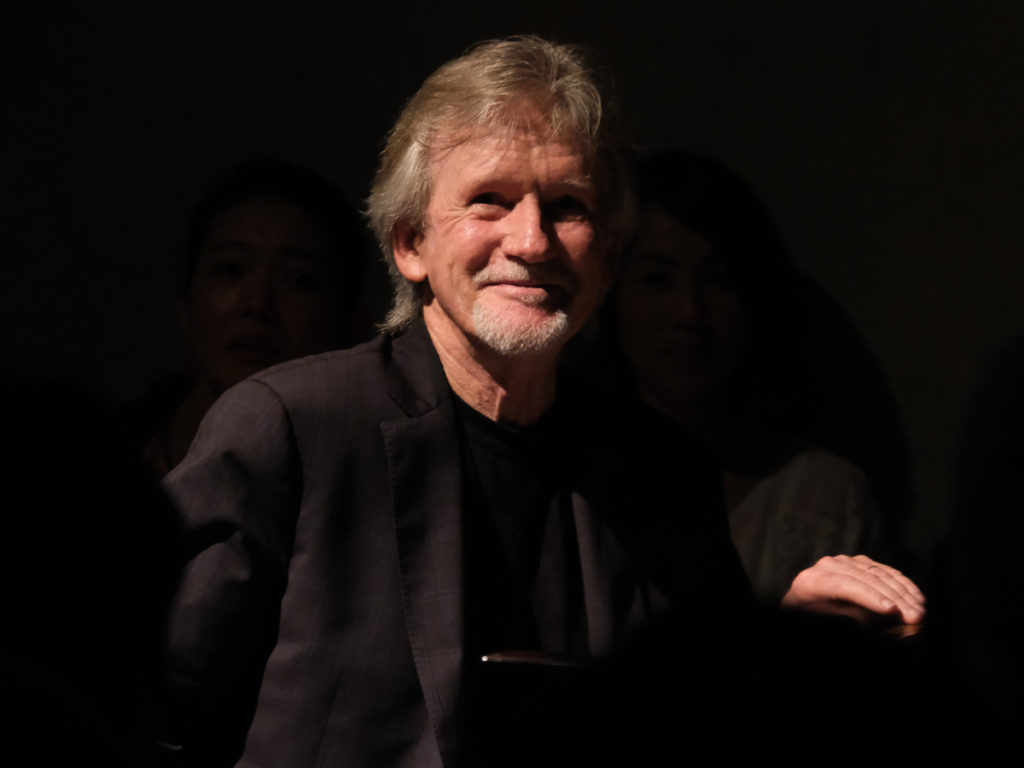
Photo by Dai Murata
M: So what is your goal, or the message you want to convey through your music?
AB: Well, the same thing: my goal is to always try and get better, even at my age! I am still striving to understand the orchestra more, to understand Gustav Mahler more, to understand Charlie Parker…the goal is never-ending! Because once you reach this part, there’s more to go. So, in that way, we live lives that are never-ending in the goals that we seek. Hopefully you achieve some, and continue on.
M: What is the source of your passion to keep yourself creative?
AB: For sure, my love for Gustav Mahler. I’m not the only one in the world that feels like this. There are many, many people. His music reaches us, or me, in a way that no other music does. Is that over a hundred and ten, twenty years? Mahler reaches out to me and says, “Alan, I have something I want you to hear.”
And Chopin does that to me, as well. When I was 8 years old. I heard Chopin. And I knew inside of me that somebody was speaking to me. I couldn’t explain it to my friends. How would I tell my 8 year-old friends, “Chopin is speaking to me”? They would think I was nuts! But I kept it to myself, and I always knew inside that there was that power of music. And that’s how I found jazz, because it’s immediate. It’s now. It’s in the present. Every note. The great, great improvisers are always in the present. I guess it’s somehow like Zen. The path is clear.
M: Absolutely.
AB: But yes, the power of Gustav Mahler and musicians that I love is the source.
M: So to conclude, what do you love about jazz? Could you give any messages for singers, musicians, and jazz lovers in Japan?
AB: The musicians I’m closest to are obviously Bill Evans, especially the early Bill Evans recordings, when he was not sick. And Bud Powell – very, very important. And of course Charlie Parker, it has to be Charlie Parker. And there’s all the other people that we love, too. But the most important musicians to me are Mahler, Chopin, Bud Powell, and Charlie Parker. And there’s a lifetime of study right there, you know? All I would suggest to a singer or a piano player, or any kind of musician who wants to be a jazz player, and who loves the music, is that when you hear something you love, to study it — to study everything about it,
Billie Holiday’s vibrato – you must study everything, the way she phrases over the bars — to know it intimately. So that you can recall in your head when you’re walking down the street. You can stop everything, and Billie Holiday can be in your mind. When it’s inside you, then they teach you. Not to copy them, but because they teach you to be yourself, and how to do it. It’s that mysterious way of learning that is not so much book-learning, but learning from the person who is doing. Which is the way of jazz learning, I think. The classical way is much more rigid — you have to learn your scales, you have to know all your Chopin, Etudes, and everything to even begin to think. But for jazz musicians, it’s a little looser. Bud Powell could never play like Yuja Wang.
M: Right.
AB: By the way, just as an aside, do you know Yuja Wang, the classical pianist? We’re living in a time in which Yuja is, in my opinion, the greatest pianist who has ever lived. I’m talking about Horowitz, Rubinstein, Hoffman, Michelangeli, any of the greats. There’s Lang Lang, but Yuja has this ability to play a piece as if she composed it. She even said that in an interview I watched last night. She feels sometimes like she is composing it as she is playing. And I can tell. She is like a jazz musician in that she goes completely away.
She even said that she doesn’t know how it’s going to be on a given night, and it worries her. So it’s that same creative force in her. It’s a beautiful thing to see her play. It transcends everything. I’m so glad to be alive to see her.
M: I’ll definitely watch her.
AB: Yeah, watch her do Rakhmaninov’s second piano concerto. That’s an easy one to listen to. Well, she plays it like no other. When it reaches a certain high point, she is there. She doesn’t let me down, you know? Well, she doesn’t need me tell her she is great. Some day, I’d like to, though! (laughs)
So that’s what I mean — it’s this music that we love – that isn’t trying to sell you anything. It comes to us as a gift. And Yuja is a gift. She makes the lives of those who love art worthwhile and meaningful. I know that Japanese people are art-conscious at the highest level. I do believe that. There are so many great Japanese artists. Not to mention traditional Japanese artists that go back a thousand years. So, it’s in the culture to be sensitive about art. I think we musicians appreciate that about Japan the most.
M: Thank you.
AB: It’s just a fact.
M: Oh, I’m about to cry! Thank you, Alan, we learned so much from you today!
AB: Thank you, May.
About Alan Broadbent
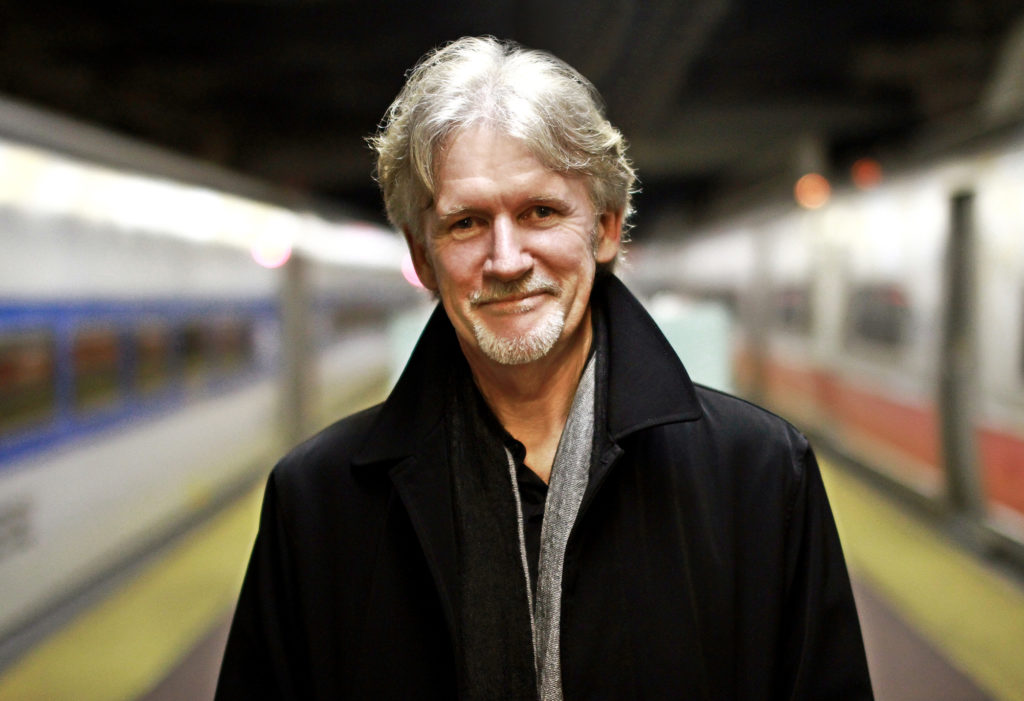
09.23.2011 Alan Broadbent streets and grand central station pohtos , New York, Juan Carlos Hernandez
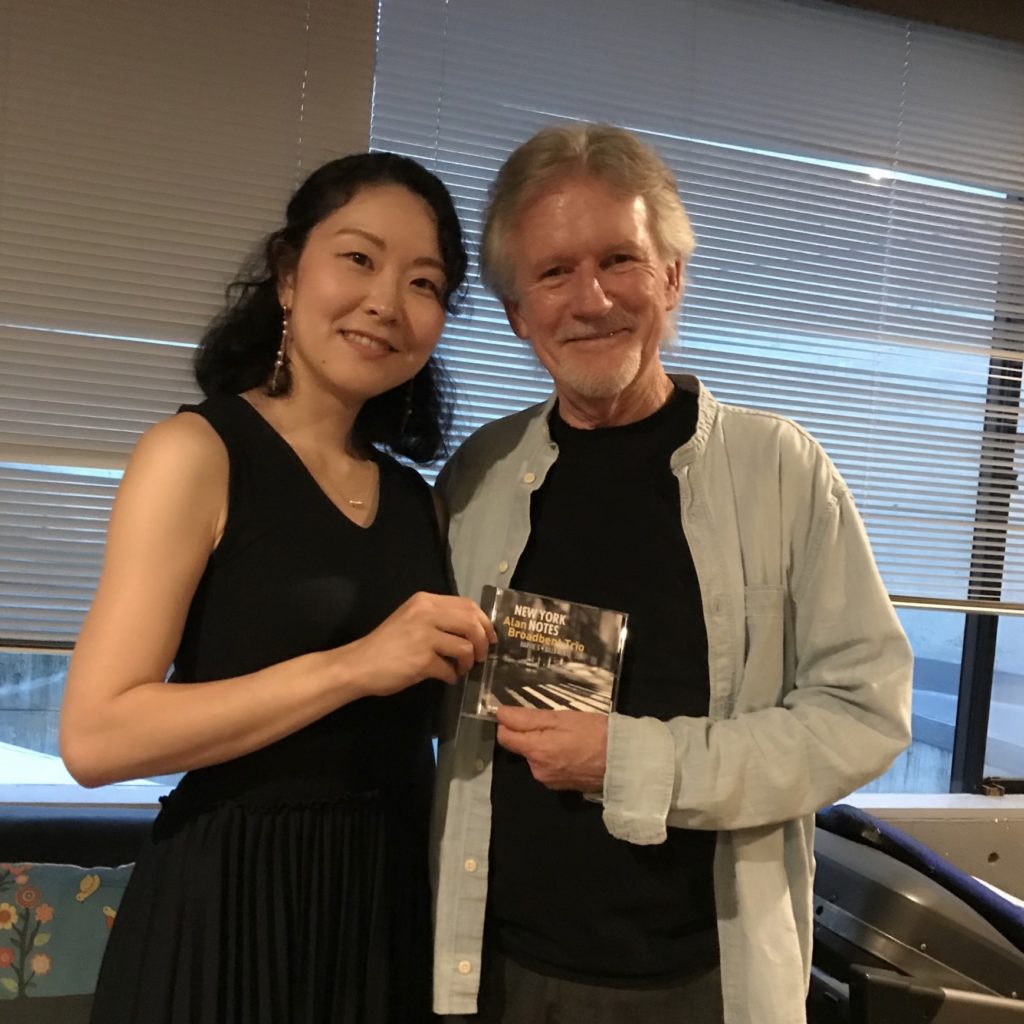
May Okita & Alan Broadbent
About May Okita (Interviewer)
– Jazz singer based in Tokyo, Representative director of JVAJ.
May Okita is an inspirational artist who continually breathes new life into each of her parallel careers as a jazz vocalist, psychiatrist, and mom of a beautiful daughter. In each area, she is graced with ample opportunity to practice living in the moment. Okita moved to Los Angeles in 2013 to both study medicine and pursue her passion for Jazz. She sought out and learned from world-class jazz musicians such as Sara Gazarek, Josh Nelson, Michele Weir, Cathy Segal-Garcia, Tierney Sutton and Cheryl Bentyne who gladly took Okita under their wings to help her on her path. In 2015, Okita founded the Jazz Vocal Alliance Japan, a Tokyo based organization which provides authentic Jazz education, resources, special events and opportunities for singers across the globe as well as the Japanese vocal jazz community. May Okita is signed with Seattle-based Jazz record label Origin Records, her debut album, “Art of Life” released in January 2019.
This interview was supported by Dai Murata (Cobe Modern Jazz Club) who invited Alan to Japan in 2019 for his solo piano concert. We appreciate Alan and Dai for their warm contribution. – May Okita(Interviewer)
